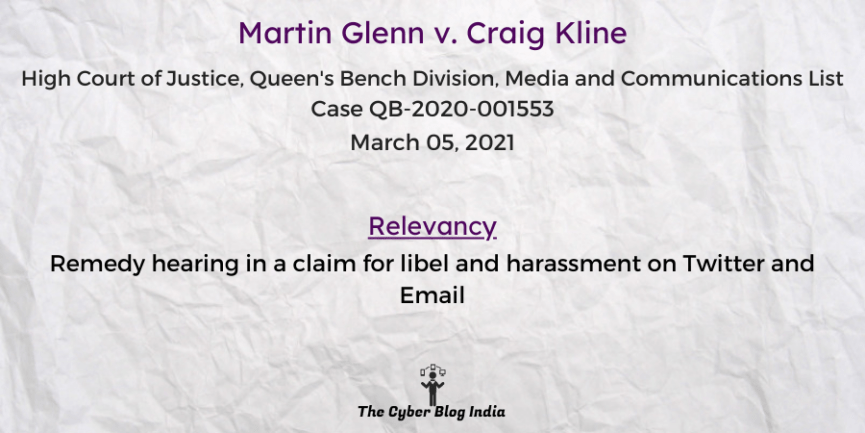Martin Glenn v. Craig Kline

Martin Glenn v. Craig Kline
[2021] EWHC 468 (QB)
In the High Court of Justice, Queen’s Bench Division, Media and Communications List
Case QB-2020-001553
Before Deputy Judge Richard Spearman
Decided on March 05, 2021
Relevancy of the Case: Remedy hearing in a claim for libel and harassment on Twitter and Email
Statutes and Provisions Involved
- The Defamation Act 2013 (Section 12)
- The Civil Procedure Rules 1998 (Rule 17.1)
- The Human Rights Act 1998 (Section 12)
Relevant Facts of the Case
- The claimant is a former CEO of the Football Association. The present case is a remedy hearing in a claim for libel and harassment. The defendant has done the same through a series of posts on Twitter and emails.
- In a previous hearing, the defendant gave an undertaking to not publish any defamatory material against the claimant or pursue conduct that amounts to harassment.
- The defendant claimed that his allegations were true. However, he remained absent for the hearing.
- He claimed that the claimant was a fraud and corrupt. He was a part of a criminal conspiracy permitting organised crime.
- After these allegations, the claimant faced an investigation by the Football Association, which lasted several months. He regarded this as highly unpleasant, intrusive, outrageous, and upsetting. He was also concerned about the impact of the defendant’s tweets on his private life.
Prominent Arguments by the Counsels
- The claimant’s counsel argued that the court should award him a single global sum to vindicate his reputation and compensate him for distress. She submitted that the defamation was grave. The defendant’s followers and other members of the public read these allegations over a period of time, damaging the claimant’s reputation.
- Internet publications are permanent, and they have long-term effects. The defendant made assertions, not suspicions, of guilt against the claimant.
- She submitted that the claimant’s right to reputation outweighs the defendant’s right to freedom of expression.
Opinion of the Bench
- The court should award the claimant one award considering the harassment and libel he suffered.
- It is reasonable to allow the claimant to increase the upper limit of the claimed amount.
Final Decision
- The court awarded him damages of £100,000 for all causes of action for defamation and harassment.
Anjali Agrawal, an undergraduate student at the NALSAR University of Law, prepared this case summary during her internship with The Cyber Blog India in May/June 2022.
